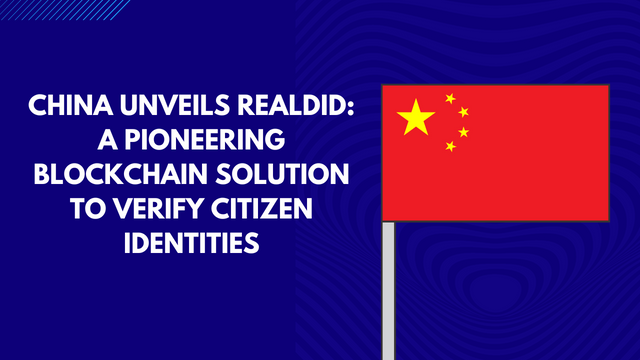China Unveils RealDID: A Pioneering Blockchain Solution to Verify Citizen Identities

In a groundbreaking move, China has announced the deployment of blockchain technology to verify the real-name identities of its colossal population of 1.4 billion. The initiative, named RealDID, is part of the Blockchain-based Service Network (BSN), a national-level blockchain project. While this development aims to enhance efficiency, it has also raised concerns among privacy advocates.
The genesis of RealDID stems from a recent government rule mandating social media influencers to display their real names, a move that now finds its technological backbone in the innovative world of blockchain. Spearheaded by China's Ministry of Public Security in collaboration with BSN, RealDID is positioned as the world's first national-level real-name decentralized identity system.
The RealDID service launch introduces a novel approach to online identity verification. Users can now register and log in to websites anonymously using Decentralized Identity (DID) addresses and private keys. This ensures that personal information remains detached from business data and transactions, a move likely to appeal to advocates of data privacy.
China's top social media platforms, including giants like WeChat, Sina Weibo, Douyin, Kuaishou, Bilibili, and Xiaohongshu, have also joined the real-name identity bandwagon. Content creators with substantial followings, exceeding 500,000 or 1 million followers, are now required to publicly display their real names or those of their financial backers, as reported by state media in October. This initiative is framed as a means to enhance credibility and enable public supervision over influential online figures.
BSN, operated by China's National Information Center in collaboration with tech giants China Mobile and China UnionPay, emphasized in a release that RealDID represents a groundbreaking advancement. It stands as the world's first instance of a national-level real-name decentralized identity system, showcasing China's commitment to technological innovation.
Despite these strides, concerns loom over the potential privacy implications of such a system. The integration of blockchain for identity verification brings a mix of perplexity and burstiness to the conversation. On one hand, the technology promises enhanced security and anonymity; on the other, questions arise regarding the centralized control and access to sensitive information.
Internationally, the implications of China's blockchain endeavors are gaining attention. CoinDesk recently reported on a bipartisan U.S. bill in progress, aiming to restrict federal government officials from using China-made blockchains and engaging with companies like Tether's parent iFinex. This measure aims to mitigate potential national security risks and safeguard private data from foreign adversaries.
In a seemingly unrelated move, the U.S. removed China's Institute of Forensic Science, under the Ministry of Public Security, from a trade sanctions list. This decision is part of a broader effort to advance counternarcotics cooperation, although concerns regarding China's human rights practices persist.
As China pioneers RealDID, the world watches with a mix of fascination and concern, navigating the intricate web of blockchain, identity verification, and the evolving landscape of data privacy on a global scale.